An Introduction from the Editor
Welcome to our 20th edition of the Wyvern Newsletter. This issue brings together some truly remarkable stories from across the generations, starting with a moving tribute to the late Erica Gould.
Our lead story from Richard Cockwell, founding pupil and first Head Boy, particularly resonates as we look toward our next edition's focus on supporting young people with dyslexia today. As a community that understands this journey better than most, watch out for our call for contributions at the end of this newsletter - your experiences could help guide the next generation of parents and children.
We also have Hugo Sanders' entertaining account of finding his path to the Scottish Borders, Clive Burke's tale of schoolboy engineering, and some wonderful archive pieces that capture the spirit of Stanbridge life in the 1960s.
Enjoy the read!
From the Chairman's Desk
by Peter Bragg, 1960-1964
Dear Wyvern,
I hope you are keeping well.
The Late, Great Erica Gould
The Service of Thanksgiving for the life of Erica Gould took place at St Thomas' Church, Lymington, on 21st August 2024. The Service was attended by family, friends and Wyverns. Lorraine highlighted her personal recollections of her Mother's life, and Frances gave a very interesting breakdown of all the significant events both in the UK and worldwide that took place during Erica's 98 years of life. After the Service we were invited to a reception at Dick and Erica's home, which they moved into when Dick retired from Stanbridge.
I arrived at Stanbridge in September 1960 and one way or another have kept in touch with Dick and Erica till now. I invited them to my 21 st Birthday Party at Crockfords in 1967 and they both came, along with John and Marjorie Abraham. It was quite a party and I remember seeing Erica 'Twisting the night away!'
While at Stanbridge I was very much aware of the huge support she gave Dick. Every leader needs support and she did just that. She was particularly keen on standards, and manners. She enjoyed tennis. On two occasions I was her partner in mixed doubles.
After retirement Erica and Dick would attend Speech Day from time to time which would enable them to see the ongoing changes being made at the school. One of my biggest sadness’s was having to tell Erica and Dick and also John and Marjorie Abraham that the school was closing down. Their life's work gone at a stroke. For many of us this marks an end of an era.
A couple of photos that Tim has asked me to forward. The first one is Speech Day, 1984, when Dick & Erica retired. The second photograph, 2016, is from John Abraham's 80th birthday party.
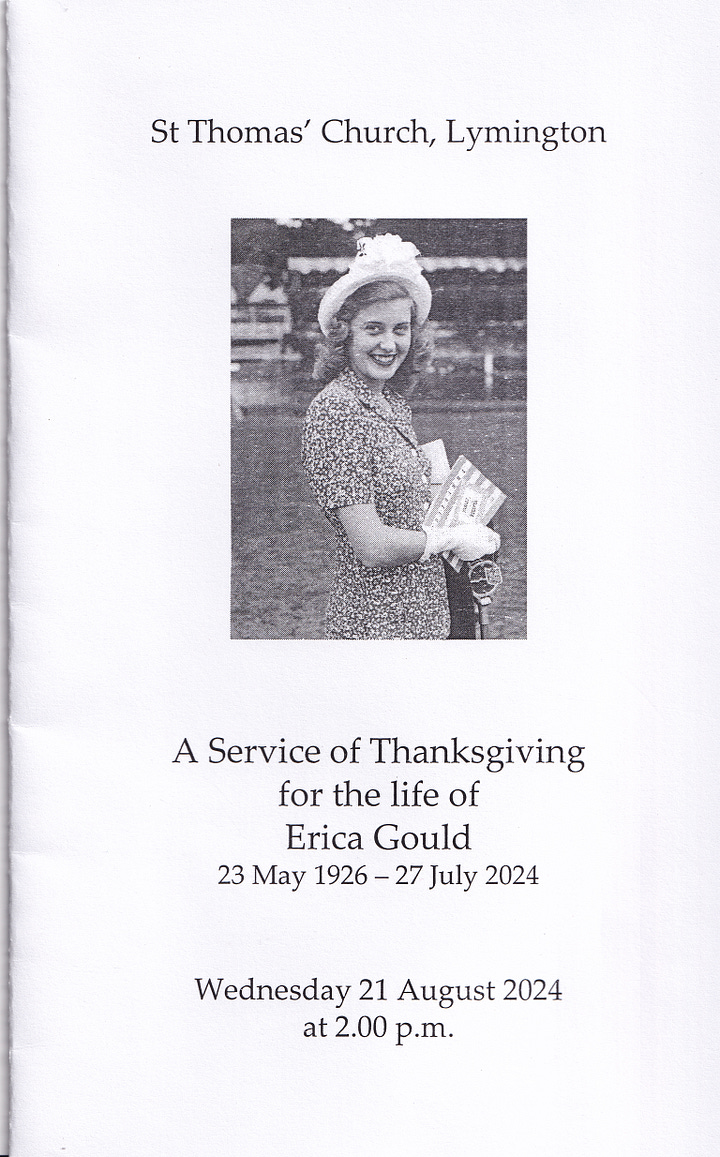
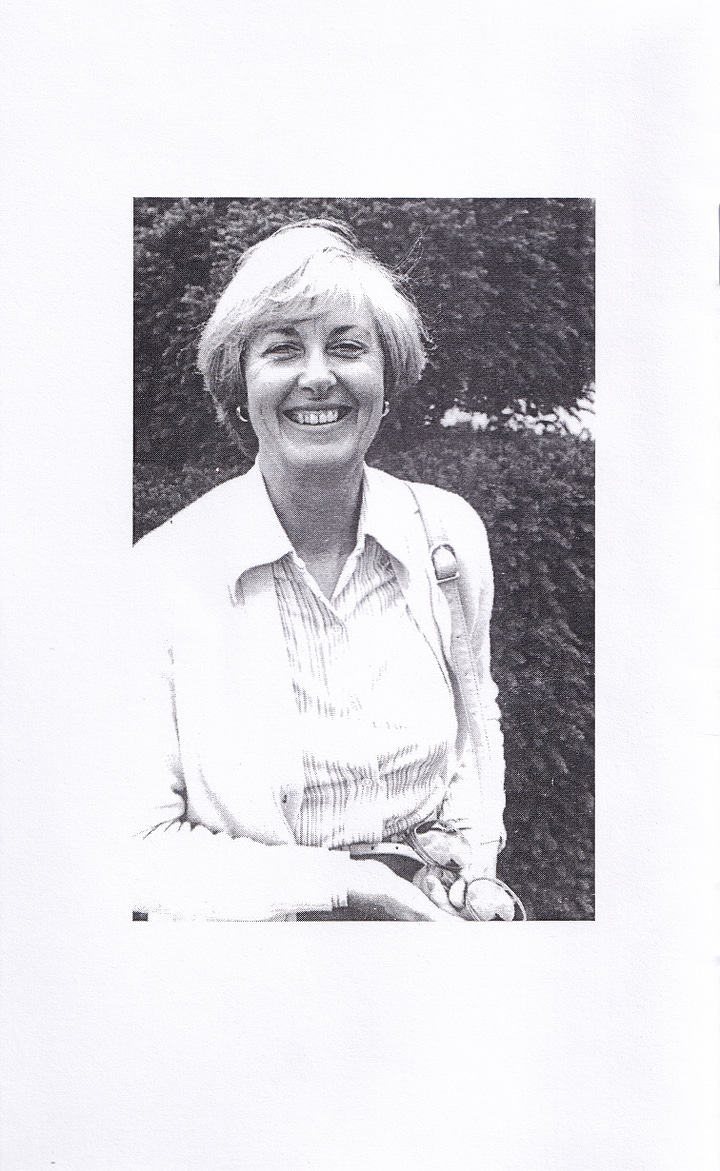
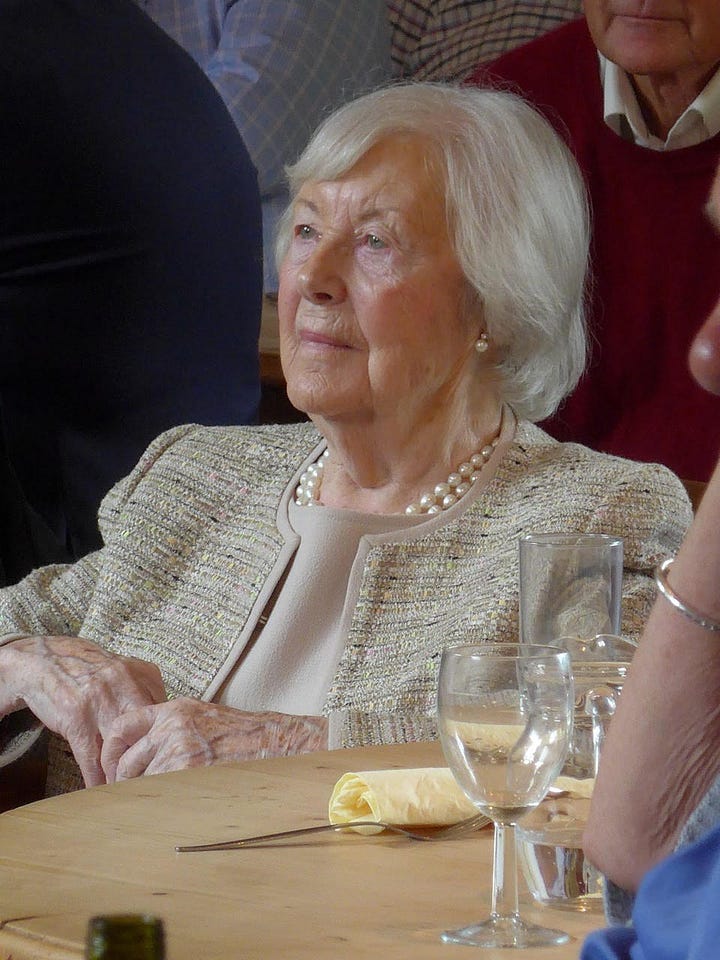
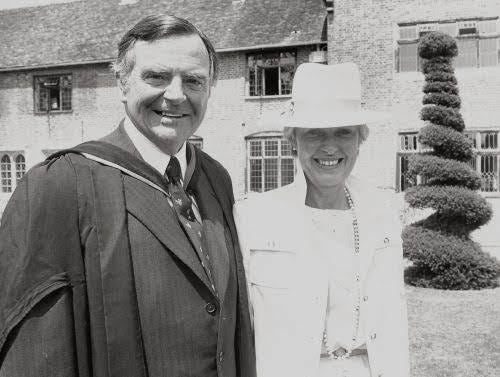
Looking Forward: Reunions in 2025
For my generation and those who soon followed, we experienced some very good times at Stanbridge. The school was doing well, so let us not forget that exciting period in the history of the school. To that end we will be organising a series of small lunches at Audley Stanbridge Earls during 2025, to celebrate 'The good days.' We are expecting to have the first of those lunches in May 2025 and if successful we will have more.
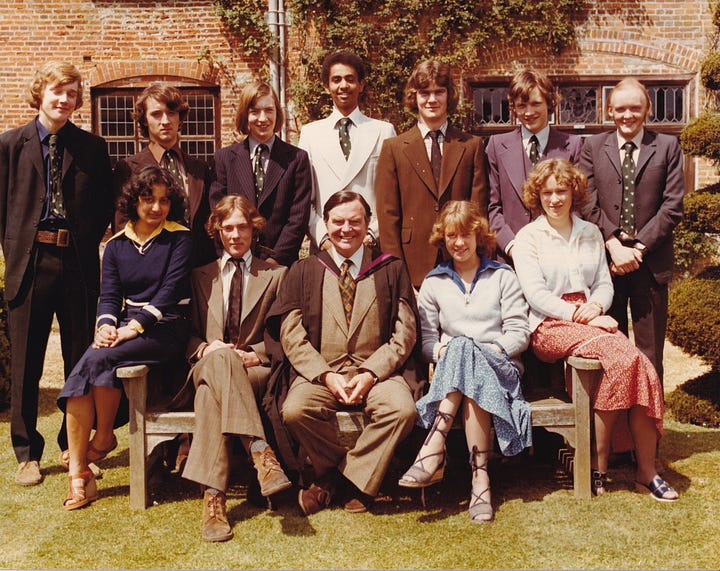
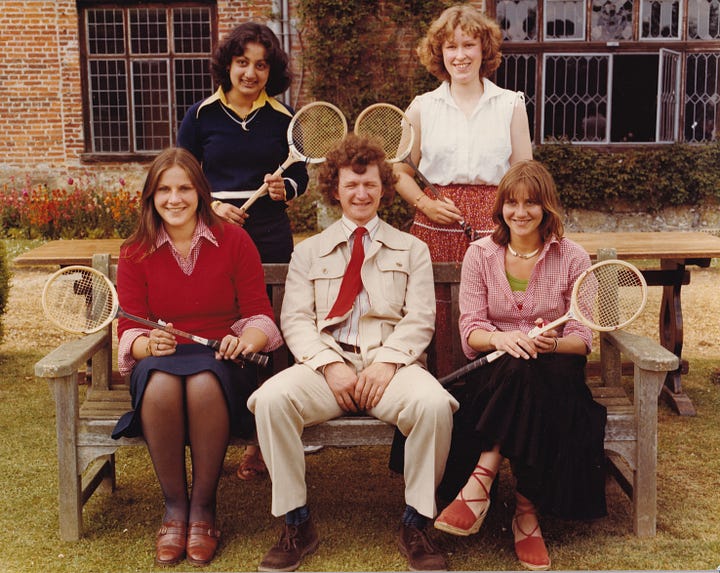
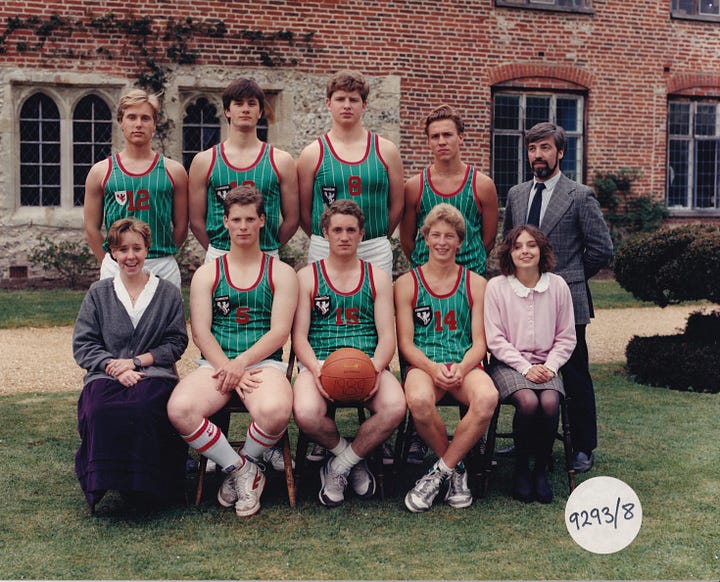
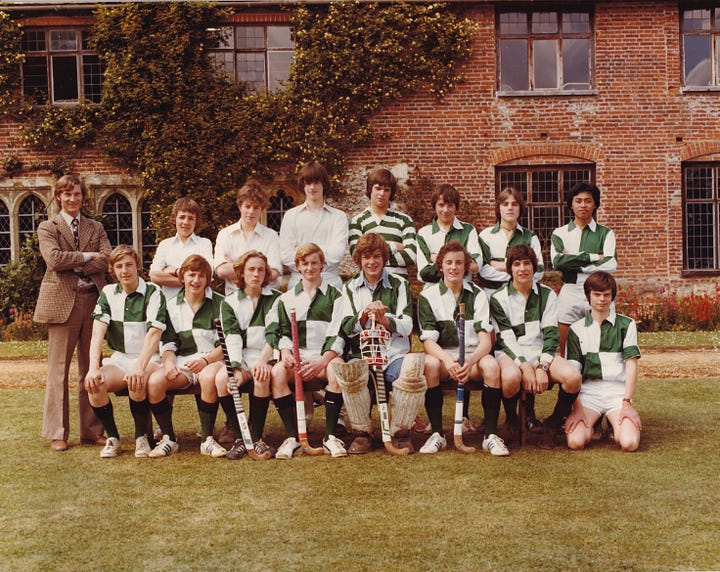
Christopher Rowney has been trying to organise a 'Pub Night' in London but has experienced some difficulties. The 'Parcel Yard' which we have used before wanted a substantial deposit, if we wanted a reserved space for our exclusive use. Chris tried other establishments and they too wanted either a deposit or a guarantee of a minimum spend, for a reserved space. We will continue to find a well located public house in London for a reunion, but it will need to have sensible house rules!
Once again I would like to thank Ben O'Hanlon for his work in producing this Newsletter.
Best wishes,
Peter Bragg
Wyvern Stories
In this edition, we're privileged to share three remarkable journeys that showcase the diverse paths our Wyverns have taken. From our founding pupil's story of resilience and achievement, to a candid account of finding one's way in the Scottish Borders, to a tale of schoolboy engineering that sparked change - each narrative reflects the unique spirit of Stanbridge.
From Founding Pupil to the Falklands: A Life Shaped by Stanbridge
“My Life with Dyslexia” by Richard Cockwell, Founding Pupil and First Head Boy
I had always struggled with my numbers and spelling, although my memory and understanding of practical matters was excellent. At this time, dyslexia was not known, and the assumption was that I was either 'educationally subnormal' or lazy!
It was ultimately fortunate that I failed my Common Entrance exam to follow my brother to Canford School near Wimborne, even though my parents had withdrawn me from my prep school and arranged private coaching. It was fortunate as my parents found a school that was starting up that would accept me. This was Stanbridge Earls. Although there were only eight pupils in the first term, the atmosphere suited me very well, particularly as I was very shy and found large numbers of people very difficult.
I found that the relationship with the teachers was totally different from what I had experienced before: I found that I was encouraged to express myself, and although my relationship with numbers and spelling did not improve, my confidence did improve. It came as a surprise to me that as the school grew, I was made the first Head Boy!
Perhaps this is a good time to mention the teachers who still remain in my mind: Christopher Oliver, Richard Hunter, Frank Daunton, and of course Richard Thomas. They all contributed to who I am and what I have achieved. Richard Hunter's statement that "one should be an individual but within a community" has led my life!
Although I still found large numbers of people difficult, Stanbridge and the various staff members made me aware of life in general and the role that we all have in it.
I left Stanbridge with a confidence to face the world, although I was still very shy with people. For some reason, I had always been interested in farming and in particular sheep, so at the age of seventeen, I took the plunge and immigrated on my own (a 'Five Pound Pom') to Australia to work on sheep farms. I learned a lot about the industry and enjoyed the life there, but I found that the heat did not suit my health, so I returned to Britain in 1960.
My family had a small farm attached to our home and I was persuaded to take it on; however, after running it for three years, I realised that I really wanted to return to extensive sheep farming. After some searching, I was offered the position of assistant manager on a 150,000-acre sheep farm in the Falkland Islands. The farm turned out to be on the West Island and was at that time very isolated. The only way to get there was either to fly in a float plane or wait for the six-weekly visit from the local passenger/cargo ship!
Two years later, I was appointed to succeed the retiring manager and remained in that post until 1983 when the farm was sold and broken up into seven smaller farms. During my time as manager, I found myself being appointed as a director of the Sheep Owners' Association, a Justice of the Peace, and various other public positions. In 1982, the farm was occupied by Argentine troops, and I found myself having to look after the farm settlement and all the employees and families, ultimately negotiating their being able to leave the farm settlement for places that were not occupied, leaving my wife, our two children, and one shepherd to look after the settlement. This period is too difficult to describe in detail, but finally, we were liberated on the 15th of June by the Royal Navy.
When the farm was sold in 1983, my wife and I, with the support of the Government, established a mill to process Falkland wool into yarn in order to increase the value before exporting. Although we were able to produce a very acceptable yarn, the cost of energy plus a lot of bad advice forced its closure after a number of years.
This was the time when I stood for election to the Falkland Islands Legislative Assembly and was duly elected. By this time, my lack of confidence had diminished, and I was elected to the Executive Council, which is the policy maker for the Islands. Fisheries was by that time the most important industry, and I chaired the committee which revised and modernised the industry and made it the multi-million-pound industry it is now.
Another position that I held while an Assembly member was the Falklands representative on the Commonwealth Parliamentary Association—an association with members from every Commonwealth country. While a member, I was appointed to the Executive Committee and even elected as Vice Chairman one year! Upon my retirement from the Assembly, I was awarded an OBE for my contribution to the Falklands.
For my 60th birthday, I took a painting holiday and as a result became a prolific watercolour painter! My Falkland landscape paintings have been bought not only in the Islands but all over the world!
What a change from the shy and educationally subnormal child (now diagnosed as dyslexic) to a confident person who is able to address large gatherings without any notes! It was because of my time at Stanbridge that my life has gone as well as it has!
A Road to the Scottish Borders
“Life After Stanbridge” an auto-biography by Hugo Sanders, Class of 1975
I left Stanbridge, with two measly O-levels, at the age of seventeen. I wasn't dyslexic but I was a deeply confused and stressed-out young man, mostly due to family difficulties. As a result, I had no organizational skills or confidence. I used to lose everything and what landed up in the lost property cupboard, I could never get round to picking up. I just existed in a shambolic haze. My family's expectations of me were zero. My memory and organizational skills are still pretty poor. But somehow, I managed to pull something out of the bag —eventually—and this is how it was done…
Somehow, I had found myself in Cape Town, South Africa, at the height of the Apartheid era. Studying for a diploma in drama, I quickly realized I didn't have a snowball's chance in hell of making it. After all, the other students, who were far more talented and dedicated than I, didn't have a snowball's chance either. During this time, I witnessed, at first hand, the grim events of the anti- apartheid riots and, considering it a good cause, I joined in. I was absolutely delighted when I got arrested and very lucky indeed to be released without charge. Other than that, I hitchhiked across the length and breadth of the country meeting all sorts of people from all walks of life. Apart from having to endure life under an ultra-right-wing regime, another issue was, I was totally skint. So much so, I couldn't afford to eat. In fact, I shrank from a beefy 12.5 stone to a skeletal 9.5 stone in 3 years and I was caught shoplifting food on several occasions in department stores.
When I finally got back to the UK, my parents presented me with a letter from Dick Gould saying that he now knew I had been smoking weed at the top lake and that if I didn't return to Stanbridge and apologize, I should consider myself expelled. So, I went expecting short shrift and a proper dressing down. But it wasn't like that at all; I made my apology and all the staff were extremely kind and gracious to me.
Meanwhile, the riots in South Africa had turned into an ugly armed rebellion. I considered returning, joining the African National Congress and taking part. Luckily, my mother persuaded me that I didn't have the will or inclination to shoot anyone, no matter how much I disagreed with them, or be captured by the infamous South African police and have my vital organs electrocuted while wired up to a lamp post.
So, I drifted instead. I used to work on farms and building sites and a coal yard. I just didn't have a purpose, so the Lord of Misrule reigned supreme. I drank about eight pints a night on weekends, then I would thunder along the lanes and back roads on my motorbike at seventy miles an hour, narrowly avoiding horses, chickens and lorries. The suspension was wrecked and so were the electrics but it could do about 120 mph. The first weekend I bought it, I was leaving a party at 3:00 am and I managed to ride straight across a busy main road, just as the lights cut out. I found myself weirdly skidding all over the place, at great speed, in the pitch dark. I desperately struggled to a halt and miraculously managed to stay upright. I just couldn't work out where I was. Then, I heard a cow mooing right next to my ear as it rubbed its neck against a metal gate. I had landed up in a muddy farmyard. A month later I did exactly the same thing a few miles further up. One evening, I remember stopping outside a pub car park, climbing on top of an open-top Aston Martin and peeing all over the seats.
After a few years of this, somewhere, through this alcohol-induced haze, there was a thin, plaintive voice crying, "There's got to be more to life than this," and after a while, I realized I was bored of just drifting. So I left, much to everyone's relief. The good folk of Petersfield could rest quietly in their beds once more and as an extra bonus, I probably added another forty-plus years to my life.
I then met and married my first wife, Ruth and after many more twists and turns, managed to get a degree in 3D design in wood, metal and plastics at Bristol Poly. I then worked as an interior designer, renovating pubs, clubs and hotels and later as a design engineer for a company that made prefabricated, modular offices. Interestingly, my boss at the time used to be a friend of Ronnie Biggs, the Great Train Robber, who escaped prison to live in Brazil (in fact, he introduced Ronnie to his headmaster's daughter and they later married). Then, out of the blue, came Black Monday. Interest rates went up to a crippling 15%. Inevitably, I got the boot and I had a large mortgage to pay off on my tiny terraced house. However, by a stroke of luck, three months later, I was asked back, freelance, on twice the pay I was getting before.
By this time I had met my second wife, Louise, who was a student teacher. She has blue eyes, blonde hair and is stunningly beautiful. She is also great fun to be with. But most importantly, for the first time in my life, I had met someone with an unshakeable and unquestioning faith in my abilities.
With the freelance work, we were able to save up just enough cash to buy a large derelict house in a village in the Scottish Borders.
I gave the prefabricated, modular office guys my notice. My boss wasn't pleased. Then, the MD arrived at our tiny regional office in Bristol and took me out to lunch. Afterwards, over coffee, he asked me if I would undertake some espionage work on behalf of the company. I was so overwhelmed by the situation and the presence of the big man, I foolishly said yes. Fortunately, a week later, I had come to my senses and told my boss I would not do this under any circumstances. With this, Ronnie Biggs's best mate rose from his seat, let out a roar, backed me into the filing cabinets and proceeded to beat the crap out of me. After that, things were rather awkward between us until it was time for me to go.
We arrived in Scotland, on a damp cold morning, at 3 am with all our worldly goods in a van. We found our property in a terrible state; there was a massive crack going all the way up the chimney, holes in the roof, part of the north wall had collapsed, there was no heating and it was freezing cold. Curiously enough, an old lady of ninety used to live there, until she was finally persuaded to move out. They make them tough up here. However, we managed to get a grant to do it up and we spent about a year sleeping on pallets with a pile of concreting gravel in one corner of the room and a cement mixer in the other. We cooked on a Baby Belling. Louise was now a part-time teacher and had to look presentable. So we bought a large metal cauldron with a heating element to wash in.
During this time, the Scottish Building Inspectorate got very interested in what we were up to, so I had to start learning about building regulations and submitting proper detailed plans for approval.
We completed the renovations just before our first child, Joe. We were exhausted and keen to relax into our new life and get to know the neighbours. However, we were beginning to learn that Scottish villages can be pretty rough, more like Rab C. Nesbitt than Miss Marple. It turned out that we English were pretty unpopular at the time, it being just after the poll tax riots. Droves of young lads would stagger past our house after closing time shouting anti- English slogans through our letterbox and throwing empty beer bottles through our windows, etc. To our consternation, the next town along, a fishing port, had the highest rate of heroin addiction in the country. But what clinched it was the murder; one of the local lads had got into an argument with an incomer. This had been raging for days and apparently fuelled on both sides by drink and drugs. The body was found on a footpath about 150 yards from our house. So, two young toddlers later, we bought a smallholding three miles up the road. This had a derelict cottage, a lot of pig sties, two lovely stone barns, one with asbestos roofing, the other with no roof at all, a hay barn, two and a half acres of land, not one tree on it and an awful lot of scrap.
It had been owned by some Gypsy ladies, sisters, who had gone into receivership as not a single installment of the mortgage had been paid, or any of the bills. It was on the market for a lofty £120,000 but no one was interested. After eighteen months it was down to £80K. We put in a cheeky offer of £60K and provided we could complete within a week, it was ours.
In the winter of 2000, having just managed to move in, we were snowed in for a week. We couldn't get to the shops. The whole region was out of power. Maximum temperature was minus ten degrees Celsius during the day. We had to break the ice in the water trough, twice a day, for our six geese and two sheep, Ethel and Fred. There was not a shred of insulation in the cottage, or central heating. We spent our days shifting snow and hunting for things to burn on the stove. We all slept in one bed, fully clothed, with loads of overcoats on top with a little transistor radio for vital local news and entertainment. The boys were getting cabin fever and Danny, our youngest, tried to climb up the Welsh dresser until it fell on top of him smashing all the wedding china.
When power returned and the spring came, it was obvious we needed a better house, so I got drawing. I had an A0-sized drawing board set up at the bottom of our bed and started making plans for a large traditional 5-bedroom house, with crow steps going up the gable ends, stone quoins around the doors and windows, etc., and loads of insulation. It would sit on the end of one of the stone barns.
Before that, the first thing we needed to do was plant trees and hedges; we bought cherries, limes, oaks, sycamore, hazel, honeysuckle and hawthorn. When all was done to my satisfaction, I stepped back to admire my creation before going contentedly to bed. The next day, to my utter rage and consternation, one of our sheep, Ethel, had managed to crawl under the fence and was now happily munching on our tiny saplings. I went to the shed and picked up the 7lb sledgehammer.
I raised it over Ethel's head, like Abraham preparing to sacrifice an eldest son. Then, Louise ran over and very strongly dissuaded me from committing the deed. Both Fred and Ethel led happy lives after this and eventually died of natural causes and never escaped again.
On day one of the building project, whilst clearing out the muck, illegal medical waste and old electrical wiring from the barn, something told me I really ought to get those wires checked out. I phoned the electrician. He said, emphatically, he had no time to visit that day. Tired of waiting around, I began to hack through the wires with my jemmy, when he suddenly arrived and started checking out the main connection and switch to the wooden pole. It turned out the two charming Gypsy ladies had rigged up the mains electrical switch to make it appear to be off when, actually, it was on and yes, the whole system was very much alive.
The new house took about three years to build. I started on my own but eventually raised a mortgage, got expert help and laboured for them, learning a great deal on the way.
After that, I worked as an Architectural Technician but being self-taught, I never really fitted in. Scottish building bureaucracy, by the way, is enough to drive anyone utterly insane. Still, I paid off the mortgage and I was free once more. I then started on the other barn, which is a bit like Celmi in style. It has lots of loft ladders and mezzanines. It's not an eco-home because it's got oil central heating but it's incredibly energy efficient; £400 will pay for all the heating, hot water and electricity for a year.
We started renting it out as an Airbnb. Funnily enough, it attracted a lot of ladies' hockey teams, all keen to celebrate after a big win. The atmosphere was raucous good humor as they drank and caroused, cheerfully, around the hot tub into the wee hours. Then we stupidly let it out to a party of Glaswegian twenty-somethings over Hogmanay. That was a big mistake; when we finally gained entry, the place was strewn with broken glass, spilled wine, vomit, discarded clothing, etc. I was properly gnashing my teeth as I was clearing the debris but had to admit I would have been doing exactly the same thing at their age. Also, two other things came to mind: 1) I'm too old for this and 2) never again. We now rent it out to a placid hippy, who when not taking yoga classes, quietly meditates. Since then I have rescued a little two-bedroom town house in Berwick, a two-bed flat in Leith, Edinburgh and a small cottage in Cumbria.
Back in 2012, I did a spell of volunteering in Moshi, Tanzania, building houses for single-parent families. I went out again in 2014, on my own to see if I could get a borehole pump installed in one of the villages but failed miserably. I did make a lot of friends while I was there, however, and if I could get enough cash together I would love to have another crack at it.
So, that's me in a nutshell. It's been twenty-five years since we moved here. The trees that Ethel ravaged eventually recovered and are now thirty feet high. There is a carpet of bluebells below the canopy. The hedges are tall and thick and the whole place is full of wildlife. I currently spend my days cooking and cleaning for my bed and breakfast and maintaining the property rentals. I have a condition called Ménière's disease which means coffee, tea, alcohol (well maybe not), chocolate and salt are all out for the time being. Life, does indeed sound a bit dull but actually it's quite fun. A couple of years back, I took up Brazilian Jiu-Jitsu, which keeps me fit and healthy and out of the pub. When friends ask why I get so much pleasure out of getting a proper beasting three times a week plus a good throttling my wife puts it down to my public school upbringing.
Louise has risen through the ranks and has gone beyond head teacher status to designing senior leadership courses for the Scottish Government. Danny has a degree from Leeds College of Music, in jazz drumming, an MA, with distinction, from SOAS and is now head of music at one of London's tougher academies. Joe spent four years studying the Gaelic language at Glasgow Uni. and received a 1st degree with distinction and an MA in publishing. He is working for The Chamber of Commerce. So, fortunately, they both take after their Mum.
I am enormously grateful to my family for putting up with years of hardship, second-hand clothes, cheap mobile phones, etc., without a murmur of complaint, in fact, quite the opposite. And, to Southdowns 6th Form College, Waterlooville, for scraping me off the pavement and setting me back on track all those years ago. Lastly, I am deeply indebted to the old school, especially Celmi, for teaching me that there is more than one way to skin a cat and that a little discomfort can often go a long way.
If I had any advice for that cocky, worm-chested seventeen-year-old, released from Stanbridge in 1975, it would be this: just listen and you will learn.
The Tale of 'The Major'
A memory from Clive Burke (1977-1980)
Three Stanbridge boys, a three-wheeled farming truck, and one excellent adventure. Back in 1980, Clive Burke, Ben Smith, and Frank Kern took on the challenge of dismantling and rebuilding a basic farming truck they affectionately dubbed 'the Major'.
Their workshop was the top field, their fuel supply relied on bicycle runs to Romsey, and their engine was a humble single cylinder. This hands-on project would later prove to be one of the inspiring sparks for Stanbridge's motor mechanics facility.
Today, all three friends remain connected through Facebook, their schoolboy engineering project having contributed to a rich tradition of practical learning at Stanbridge. It's a reminder of how student initiative and hands-on projects have always been woven into the fabric of Stanbridge life.
From the Archives
Delving into our past reveals how the character of Stanbridge was shaped from its earliest days. These Chronicle extracts from the 1960s capture everyday moments that, while seemingly ordinary at the time, have become treasured snapshots of school life. They remind us how traditions were born and community spirit flourished.
Stanbridge Chronicle 1962
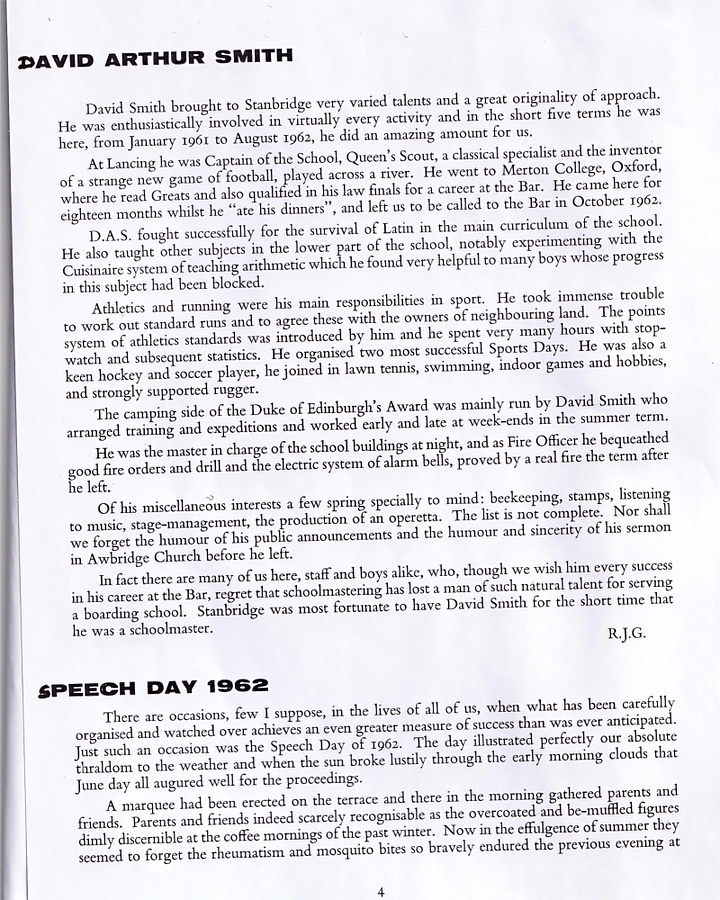
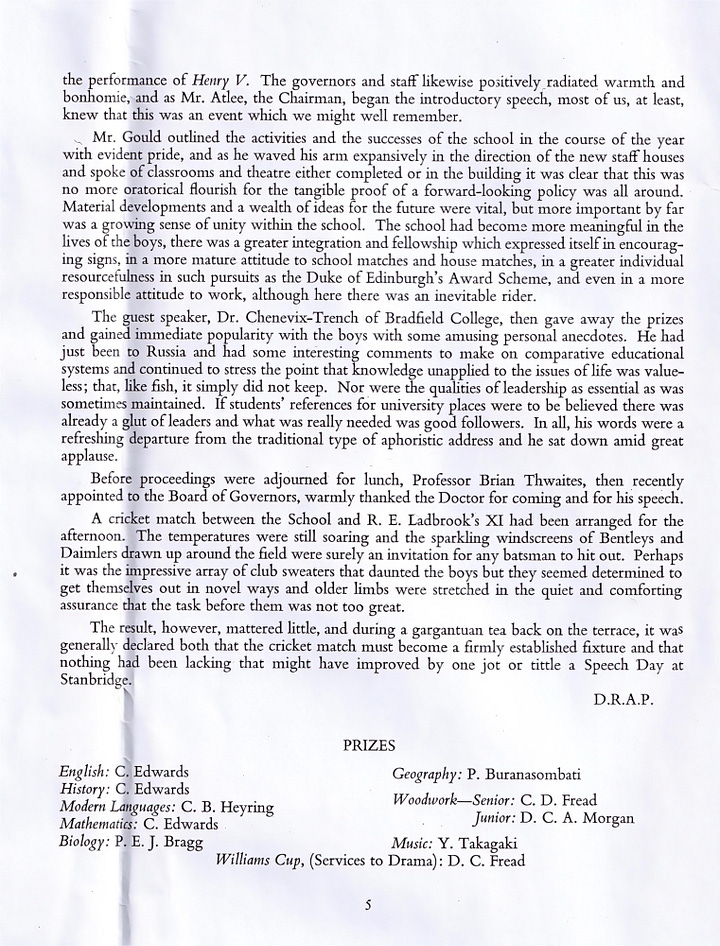
Stanbridge Chronicle 1963
Courtesy of Timothy Salter (Bibliography: The Stanbridge Chronicle 1963, pages 24 to 25, by J. Foster)
During the day of November the fifth, it drizzled incessantly, and the damp and mist seemed to be set in for days. However, the weather cleared around 7 PM and at 8, the boys wandered out in their usual disorderly fashion to the pitch where, for some days, feverish activity led heroically by Mr. Scoble had built an enormous bonfire. In front of this pyre stood Mr. Abraham's old piano which, as Stanbridge tradition orders, the Guy must play.
This year's Guy was made by those bomb enthusiasts and specialists, Christensen and Piercy. They had built a splendid figure and stuffed it to capacity with M. Gill's best weed-killer and sugar, mixed up in an old bucket. The Guy was, however, unfortunately still receiving finishing touches when Mr. Scoble lit the trail of petrol which led to the bonfire. With a deep roar, the petrol ignited inside the mass of wood and soon, never minding the wet, sparks sped skywards in a withering crackle of flame and heat.
At this moment, the Guy arrived at a fast run on its broomstick and was launched onto the already blazing chair. In a few seconds, its eyes shot off with a terrific bang and the head sped heavenwards in a red flash of weed-killer, petrol, and other inflammable concoctions brewed inside it. The heat of the fire soon became intense, and the rings of boys watched as log after log crashed in a torment of sparks into its heart. Eager faces were lit up in lurid hues as the flames flickered skywards, and all too soon the bonfire was a heap of red embers and glowing metal, all that remained of the piano and the tractor wheels placed in the centre. This seemed to be the right moment for Mr. Scoble, like the commanding officer of a rocket division, to set off the first missiles soaring to the stars. In the background, Vigne and Folley feverishly bombed the staff houses with as many rockets as they could lay their hands on. Dim figures could be discerned rushing around the playing fields recovering rocket sticks. Next, Roman candles glowed and zooming flying saucers shot in all directions. At moments, Mr. Kitchener had to duck to avoid being the target of shrieking aero-flash or sky-bomb.
When it was all over, the school thronged forward for enormous baked potatoes and cocoa served by the staff and Mrs. Gould. These were eaten with relish after the exciting evening, and the hot butter trickled through clammy fingers. Some boys armed with rocket sticks or long bamboos approached the terrific heat of the fire hoping to roast the chestnuts which crammed their pockets. The fire, it seemed, cooked them better than the chestnuts.
Soon a weary, scorched, and happy group wended its way back to the school where tired voices chattered about "the rocket that just missed me" or "the spark that almost burned me alive.
The Wyvern Magazine 1967
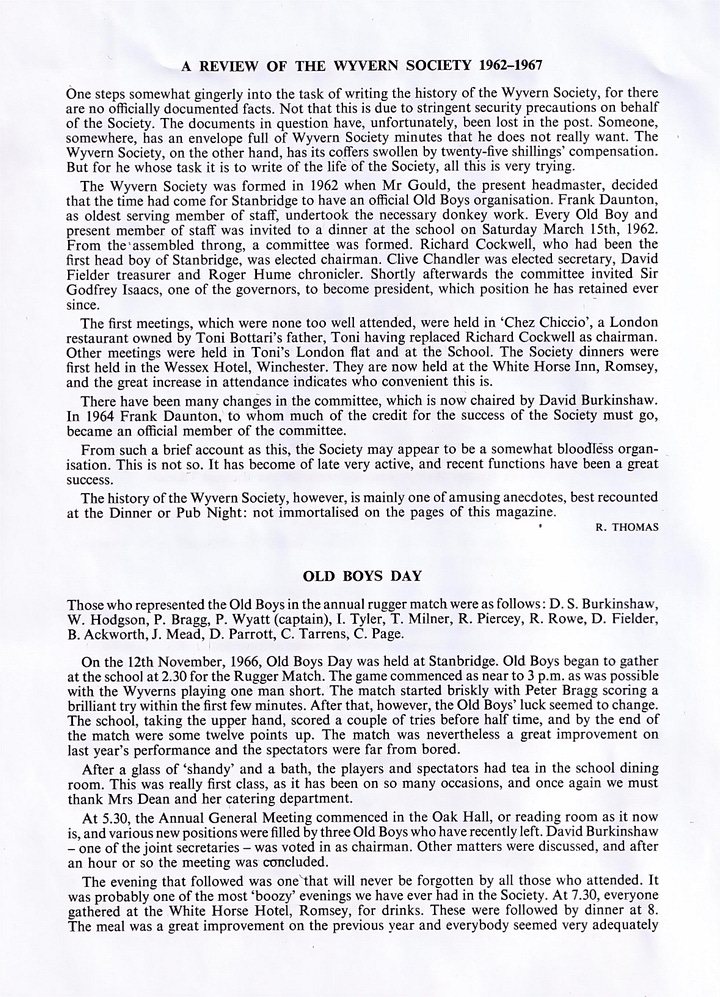
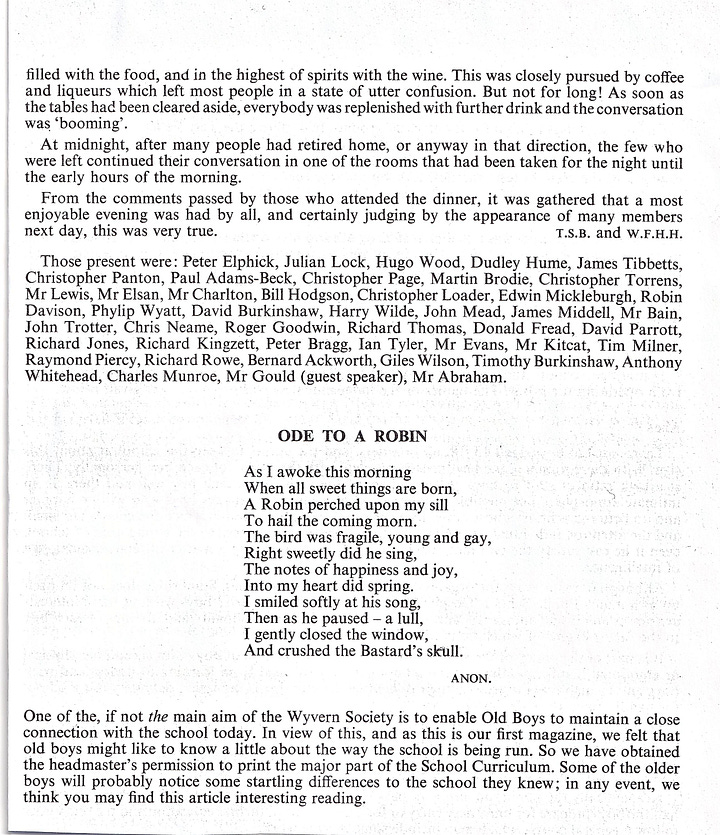
Community News
The Wyvern community spans decades and continents, yet remains connected through shared memories and ongoing friendships. This section helps maintain those bonds - whether you're seeking old friends or remembering those we've lost. It's where our past meets present, keeping the Stanbridge spirit alive.
Missing Wyverns: Seeking Lost Connections
Our Missing Wyverns section continues to bring old friends together. This month brings a heartfelt request from Ian Canham (1971-76), who hopes to reconnect with his old schoolmate Jonathan Brammal. Ian tells us that Jonathan may have moved to Australia, where he had family ties. Tom Hooper, who remained friends with Jonathan both during and after their school days, might hold some clues to his whereabouts.
If you have any information that might help Ian find Jonathan, please let us know and we'll put you in touch.
We're also still seeking news of Mark Pruen and Christian Shaftel (circa 1971-73), while Simon de lisle Bush would love to hear from his classmates from 1968-73. Simon's time at Stanbridge was spent under housemaster David Charlton.
Remember, the Missing Wyverns section is here to help rebuild those precious school connections. If you're looking for old friends or can help others reconnect, drop us a line. Sometimes the smallest piece of information can bridge decades of distance.
Obituaries
James Beecheno. I have received the sad news from Frances Charlton that James Beecheno has died. He was in D House at Stanbridge from 1969 till 1972. James was born 30/03/1956, died of cancer 25/06/2024. He emigrated to Australia in 2003, where he married and had two children.
Simon Martyn, (C, 1970) on 26th May 2024 following a short illness.
Simon Instone (A, 1975) on 11th October 2024 having been unwell for some time.
Looking Ahead: Supporting the Next Generation
Richard Cockwell's inspiring story reminds us that Stanbridge was more than just a school - it was a community that truly understood and nurtured pupils with dyslexia. This puts our Wyvern community in a unique position to help today's parents facing similar challenges.
For our next edition, we're asking for your wisdom and experience: How can parents best support young children who might be dyslexic? What would you tell a parent just starting this journey? What do you wish you had known?
As a community that has lived this experience - whether as pupils, parents, or educators - your insights could be invaluable to families navigating these waters today.
Share your story by contacting benohanlon@pm.me
Contributions needed by early May 2025 for our next edition.

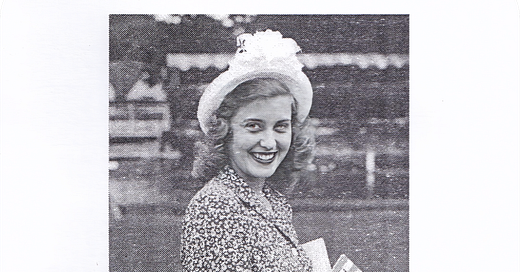


greetings, one and all! I was at SES for just one year (1995-96) and my leaving so soon was mostly self-inflicted - I would give anything to turn the clock back and do things differently. the people may have been a mixed bag (in other words, more nice staff than nice pupils) but the location was fabulous, the school existed at the right time for someone vulnerable like me (who had returned to the UK after a three-year stint overseas) and I am always happy to share any fond memories I have.
Also, I have asked this numerous times on Facebook, but to no avail - does anyone have a full colour scan of the school photograph from May '96? I never received a copy of it, I have been blocked by one or two people I turned to for assistance...and the only available pic on FB is a distant scan of it nestled among other pics (which I was not in), so any in getting a full quality upload would be much appreciated.
finally: RIP John and Marjorie Abraham, Priscilla Moxon and other staff and pupils who are no longer of this world.